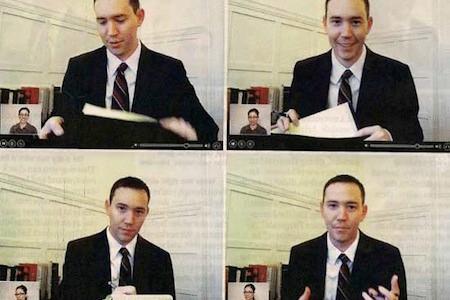Should We Fear or Cheer the Video Interview?
Published: Aug 17, 2016

Earlier this summer, Wall Street giant Goldman Sachs announced it was scrapping in-person on-campus recruiting for a software-based video interview recruiting program. The fact that Goldman, the most prestigious investment banking firm on the planet, would be using video interview software in place of human beings to conduct first-round interviews came as a huge surprise to many professionals and jobseekers alike. However, to those who follow workplace issues, it was nothing but an inevitability. Already, IBM, Cigna, and hundreds of other firms had rolled out similar programs, and millions of video interviews were conducted in 2015, up from just over 10,000 a handful of years ago. Which means video interviews are here to stay. And so, no matter if you love them, hate them, or fear them, video interviews are something you better start getting used to.
To that end, here's a look, via the Wall Street Journal, at what these video interviews are really like.
Most video-interviewing programs require applicants to click a link or install an app. Interviews begin with a prompt such as “Tell us about a time you had to deal with a conflict” that stays on-screen for about 30 seconds. Then, the camera turns on and the candidate has anywhere from 30 seconds to 5 minutes to respond before the next question pops up.
Human-resources staff then review the videos and pass along promising applicants to managers for consideration. Applicants who make the cut are typically invited to a one-on-one interview. That doesn’t always mean it will be in-person, though. Varsha Paidi, a software engineer hired by IBM last year, had subsequent online interviews and eventually received her job offer via text message.
Could layoffs via text be too far behind?
In any case, lovers of the video interview include those responsible for keeping recruiting costs down (recruiters can save millions of dollars in air travel a year not having to fly to meet job candidates and/or pay for candidates' flights) as well as companies that create video interviewing software (who "say their programs make hiring more fair because all applicants must answer the same questions, placing substance over schmoozing and small talk").
Meanwhile, haters include those who say we're giving way too much power to robots when it comes to making hiring decisions. And, to that end, this is rather frightening:
Taking robo-recruiting one step further, some HireVue customers have an algorithm review the video interviews for them. Using data about the skills and attributes companies are seeking for a given role, a program called HireVue Insights scans videos for verbal and facial cues that match those skills then ranks the top 100 applicants.
Which I guess means no frowning, no grimacing, no furrowing your brow, no facial expressions that show fear, weakness, ineptitude, etc., when recording your interview. It also means new lines of business from video interview coaching and video interview classes to video interview how-to-manuals and an endless number of video interview-related apps.
In addition to companies, schools are getting in on the fun. For example, Yale's business school is a big believer in and user of the video interview.
Bruce DelMonico, the assistant dean for admissions for the Yale School of Management—which requires M.B.A. program applicants to respond to video prompts—said that unforeseen interruptions like a roommate barging in mid-interview show how applicants think on their feet.
“All is not lost,” said Mr. DelMonico. “We pay attention to how well you respond and recover.”
No, all is not lost. But are we really to believe that if you leave to chance the possibility of your roommate interrupting your video interview for Yale's MBA progam you have a shot at admission (I am no assistant B-school dean, but I would assume that a simple lock or "do not disturb" sign on your door would work pretty well and would also show a fair amount of business, if not common sense)? If so, and Yale really likes this sort of thinking on one's feet, should video interviewees stage such interruptions to show off their thinking-on-their-feet skills? And which other skills might one illustrate through so-called random intrusions during a video interview?
Unlike Yale, IBM apparently doesn't put too much stock in how you deal with your roommate barging in because he can't find the remote. Here are some tips for a successful video interview from IBM recruiters and former interviewees at the firm:
Treat video interviews like an in-person interview: dress appropriately, maintain eye contact and silence cellphones and other devices.
Check your internet connection, camera and audio levels before starting the interview.
Secure a quiet room, free of housemates or pets. Make sure distracting posters or art cannot be seen in the camera frame.
For the camera-shy, resist the urge to play back responses or watch yourself record.
I am guessing that that last tip might be a bit difficult for the selfie generation. In any case, if you do have a forthcoming video interview, good luck. And please, lock the door before you hit record.
Follow me on Twitter.
Follow us on Instagram.
